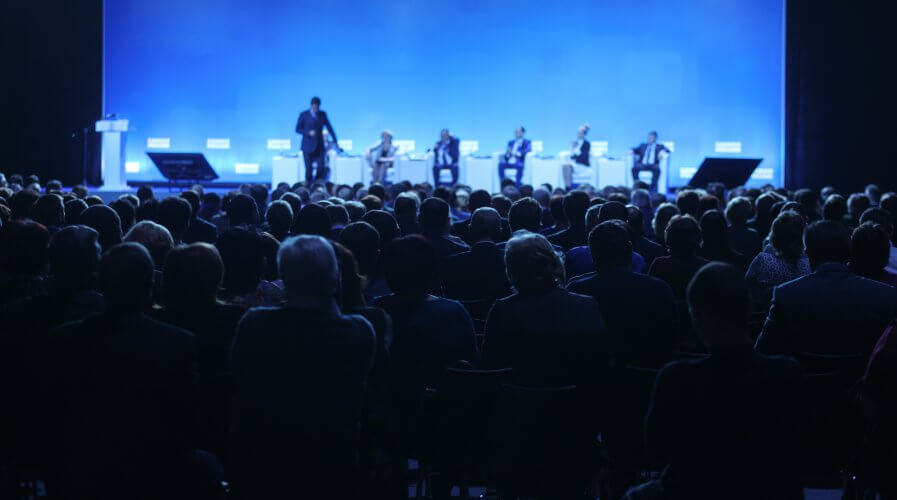
Cisco Live is an entirely virtual event. Source: Shutterstock
IT will help business ’emerge’ from crisis, says Cisco
“The future has changed irrevocably,” were the words from Miyuki Suzuki’s opener at the two-day Cisco Live Virtual Event APJC, which continues to roll live for Day 2 on Tech Wire Asia today, here.
Cisco’s president for Asia Pacific, Japan and China (APJC), Suzuki was, of course, addressing the pandemic that has left few corners of the business & technology world untouched – and yet many commentators think the crisis could stimulate innovation on the road to economic recovery.
Excited to have the honour of introducing our first ever Cisco Live Virtual, being streamed to 180 sites around the world. A new way of communicating #CiscoLiveAPJC https://t.co/dCUmxiwDCV
— Miyuki Suzuki (@Miyuki_Suzuki1) April 1, 2020
“We have to make sure that we emerge and learn the lessons from this period and make changes – lasting changes – that will benefit businesses, the market and the community at large,” said Suzuki.
Before we get there, though, businesses are first faced with the challenge of managing the disruption that the virus has caused.
True enough, the changes that are being driven by the outbreak have overwhelmed a lot of companies. The sudden shift to remote working has meant businesses have had to make sure systems remain up and running, and their cyber defense mechanisms still in place.
In the face of these challenges, Suzuki remains adamant that industry leaders can continue to thrive and adapt to the changes through technology, with offerings like cloud, automation, interactive collaboration tools, and AI-powered cybersecurity – accessible to all enterprises.
Watching @Miyuki_Suzuki1 keynote #CiscoLiveAPJC from my kitchen! pic.twitter.com/mViQEpwr33
— Jonathan Barouch (@jbarouch) April 1, 2020
Cisco, in particular, has seen an increase in the adoption and use of subsidiary collaboration platform Webex throughout the past month. Even healthcare platforms have leveraged the platform to support mission-critical services.
At the core of it all, businesses need to make sure that all of their IT ambits are cohesive with one another and can work together to create operations that are aligned – but ready to flex – in any given circumstance.
‘The superpower of IT’
This is particularly important in times where remote operations have become the main mode of working, but it can also be a lesson for businesses going forward – at an industry or individual enterprise level – as we realize how quickly the status quo can be overturned.
Indeed, Cisco’s Senior Vice President, Todd Nightingale, said the ability to be flexible has become “the true superpower of IT.”
Flexibility is particularly vital if businesses want to make sure that their teams can work efficiently and collaborative processes are supported holistically. Nightingale believes that flexibility “will allow [businesses] to adapt, change and drive organizations forward – into the future.”
Too often, businesses get slowed down by overlapping dashboards and siloed operating systems – this can burden the workforce unnecessarily and drain productivity. In striving towards a more agile way of working, Nightingale said leveraging automated systems with simple interfaces can empower the organization’s workforce at large.
Adaptability is one aspect that will ensure businesses survive turbulent market conditions and go on to thrive on the other side, but the cybersecurity consequences of the current crisis have also taken many businesses by surprise.

Working from home has become the new normal ‘overnight’. Source: Shutterstock
Not only are opportunistic hackers seeking to leverage concern around current events with sophisticated phishing campaigns, but businesses must wrangle with the implications of employees accessing corporate information and infrastructure via their own private networks.
These are trying times for CISOs and their ilk but, for the enterprising, it’s a chance to both introduce long-lasting policies that drive ‘cybersecurity first’ home to every employee in the business, and to make significant upgrades to the security systems along the way.
Cisco’s Multi-Domain Security Architect, Jatin Sachdeva, said that AI and machine-learning-powered cybersecurity systems can help manage the unprecedented threats of today, and ensure the business is reactive to new threats emerging in the mid-term.
“Security controls are only as effective as the quality of the threat intelligence that drives them,” he said, as he explained how using AI and ML enhance cybersecurity by detecting emerging threats, as well as agentless malware, and “turn web proxies into sensors.”
Additionally, with businesses now awash with security solutions, AI and ML can help automate protocols across the operating systems so IT teams do not have to attend different dashboards to activate controls each time.
Throughout its first day, Cisco Live’s keynote presenters consistently emphasized that while business continuity may be hard to achieve, leveraging the right solutions can always help.
One thing is for sure: in such uncertain times, technology has proven to be a viable, reliable and, in most cases, affordable partner to today’s future-forward businesses. Now can be a time to be conservative, but for the bold, it’s also a time to ready for a resurgence.
Continue watching Day 2 of Cisco Live Virtual Event APJC, here.
READ MORE
- 3 Steps to Successfully Automate Copilot for Microsoft 365 Implementation
- Trustworthy AI – the Promise of Enterprise-Friendly Generative Machine Learning with Dell and NVIDIA
- Strategies for Democratizing GenAI
- The criticality of endpoint management in cybersecurity and operations
- Ethical AI: The renewed importance of safeguarding data and customer privacy in Generative AI applications


